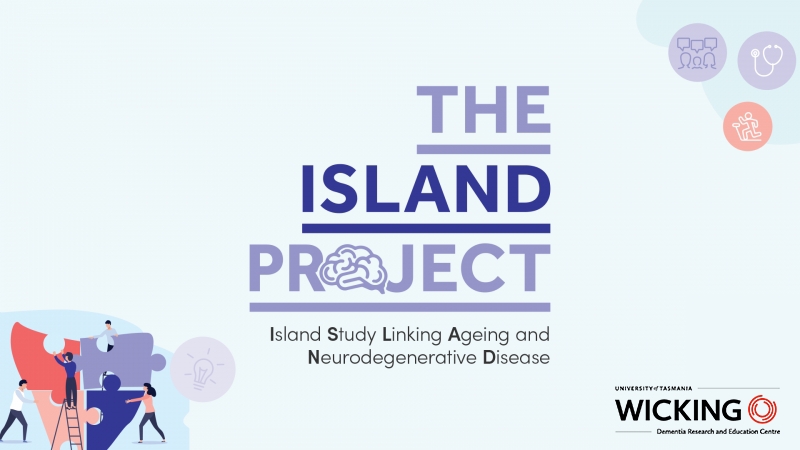| ISLAND Newsletter - December 2021 |
View in browser | Print |
 | | | 
On behalf of everyone in the ISLAND Project team, I would like to wish you and your family a safe holiday period and a prosperous new year. Let's hope 2022 is a year where we are all safe and healthy. We have been able to visit more and more communities and attend regional events this year than last and we hope to see even more of you in 2022. We are now working with a number of communities to try to raise awareness about dementia risk with even more people across Tasmania, and embed risk reduction activities in individual communities. Our first ISLAND expo in Devonport was a huge success and I extend my thanks to the team, our exhibitors, the public who attended and our wonderful volunteers who were invaluable on the day. We hope to hold more expos next year and are always looking for community groups or friendship groups that might like to learn more about ISLAND, so please send us an email and we can arrange to either come and visit you or host an online presentation. The data you continue to provide us gives us a strong base for our research going forward. Thank you for the time you have given to this project, and your commitment to our shared vision of reducing the incidence of dementia in our community. We are starting to learn more about our risk profile across the state and how our participants change their health behaviours across the range of modifiable risk. This is a long-term project, and the impact of your contributions will benefit generations to come, not just in Tasmania, but in populations around the world. Next year, we hope we can continue to increase our face-to-face presence in communities. We also hope to offer you more opportunities to participate in ISLAND activities, including a potential study on sleep quality and its association with cognition. We will continue to invite participants to complete online cognitive tasks, and our Resilience and Campus studies will continue. The ISLAND Clinic has now received more than 200 referrals and we are making valuable contributions to national dementia registries through that clinic. Most importantly, we are receiving wonderful feedback from our clients and their support persons. Again, thank you for your valuable contributions to dementia prevention research and your continued support. The project team will be taking some well-deserved leave over the Christmas/New Year period and will be back on deck from January 4th, 2022.
|  | | | 
Running Devonport to Dover for dementia research
At the time of writing, the RUN for the ISLAND team - Jess, Josh, James and Eddy - are close to finishing the 480km run along the Tasmanian Trail, raising awareness for dementia risk reduction and raise money for research.
The team was joined today by the University of Tasmania's Vice-Chancellor, Professor Rufus Black, a keen runner, as they departed New Norfolk along the trail heading to their final destination, Dover. It's fantastic for this initiative to receive the recognition and support of the Vice-Chancellor.
The team has also received wonderful support from the local community and ISLAND participants at their pop-up events and gatherings on the way. The team met with participants and signed up interested Tasmanians in stops such as Latrobe and Deloraine. The pop-up talk at the Central Highlands Lodge at Miena was a great opportunity to talk to the community about dementia research and the work of the Wicking Dementia Centre, which was not known to some in attendance. At Ouse, the team spoke to the community about dementia care. One of the aims of RUN for the ISLAND is to raise awareness for dementia risk reduction and research and the team has certainly achieved this.
The RUN for the ISLAND team has encountered hot and windy days, steep inclines along the trail, amazing Tasmanian scenery and a discarded Rod Stewart CD, and opportunistic cool-offs in streams and rivers! Covering on average 100km a day, Jess, Josh, James and Eddy have met the challenge with excitement, fun and adventure yet with a serious purpose - raising awareness and money for dementia prevention research.
If you would like to support the RUN for the ISLAND team in their efforts, please click here. The team's goal is to raise $25,000 and with your help, they can achieve this.
|  | | | 
Alcohol and the brain
It is not surprising that excessive alcohol consumption over a long period of time can lead to brain damage. Reduction in the volume of the brain's white matter as a result of excessive consumption can lead to issues with brain function, such as short term memory and increases the risk of developing dementia. Moderate alcohol consumption may be protective to the brain, with some research indicating people who drank in moderation were less likely to develop dementia than those who did not consume any alcohol. However the samples of non-drinkers in these studies comprised not only of people who never consumed alcohol but included people who no longer drank alcohol due to health reasons and thus may have similar brain characteristics to excessive drinkers. Further research is needed to fully understand these associations. According to Alzheimer's UK, individuals who do not currently drink alcohol, should not start for the purposes of brain protection against dementia. When considering how much alcohol is safe for you, it is important to remember that drinking can have adverse outcomes for people with certain medical conditions or taking certain medications. Guidelines vary around the world, but recent guidelines are highlighting lower safe limits of alcohol consumption. For most healthy people, no more than two standard drinks on any day is generally recommended. If in doubt, talk to your doctor.
For more information about recommended alcohol limits and what is a standard drink, see Managing your alcohol intake from the Australian Government Department of Health.
|  | |
The Australian Drug and Alcohol Foundation - what is a standard drink?
| | | 
The CAPITOL Project (Critical Age Periods Impacting the Trajectory of Obesogenic Lifestyles) is a University of Tasmania research project aimed at preventing overweight and obesity through community capacity building in the North-West of Tasmania. Working alongside the community, the CAPITOL team is helping to develop, implement and evaluate community-based health promotion approaches, with a focus on obesity prevention. The Project has released assessments of free physical activity infrastructure and best choice food options for Burnie, Devonport and Circular Head. Click on the link below and take a look at the Project's newsletters for more information. Read more
| | | 
The ISLAND Project team will be taking a break between December 24 and returning on January 4, 2022. We would like to send our very best wishes for Christmas and the New Year to all our ISLAND members. Thank you for working with us in 2021 and making significant contributions to our research program. We look forward to engaging with you throughout next year.
| | ISLAND Project Partners | |
|  | |
The University of Tasmania received funding from the Australian Government. Views and conclusions expressed in this publication are those of its authors, and may not be the same as those held by the Department of Health.
|
|
Stay Connected:
|


|
islandproject.utas.edu.au
|
| |
|
|